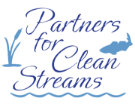Seeking New Project Ideas for Tenmile Creek Watershed Plan
We’ve been working hard to update watershed plans throughout the Maumee AOC. Now, we need YOUR input to help identify water resource projects in the Tenmile Creek area, such as eroding streambanks or spots in need of habitat restoration. Check out the new draft watershed plan for Tenmile Creek and learn how to give us […]
